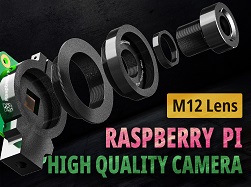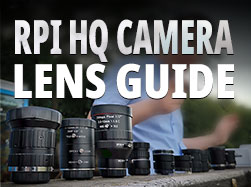Arducam 100 Degree Low distortion 1/2.3″ M12 Lens with Lens Adapter for Raspberry Pi High Quality Camera
Item Description:
In order to meet the new demands of the lens to work with Raspberry Pi High Quality Camera, Arducam selected and tested a wide range of M12-mount lenses from long focus to wide angle for shooting on your Rpi HQ cameras. It’s now much easier for you to get the best lens you’ll need, and we will keep the lens list growing in the near future.
If you want to grab all the available S-mount lenses for the HQ camera, Arducam has also got a 6-in-1 M12 lens bundle here.
Lens Specification:
- Model No: M23270H10
- Optical Format: 1/2.3”
- Focal Length: 2.70mm
- Aperture: F2.8
- Field of View (D/H/V): 113°/100°/83°
- Mount: M12 mount
- Back Focal Length: 4.97mm
- Distortion: <-1.5%
- MOD: 0.3m
- Weight: 5g
Other Arducam S-mount lenses with different FoVs
- Lenses ender 70 degree: 20° HQ Camera Lens, 50° HQ Camera Lenses,, 75° HQ Camera Lenses.
- Wide Angle and Fisheye Lenses: 90° HQ Camera lens, 140° HQ Camera lens, 180° HQ Camera Lens.
Package Includes:
- 1pcs 1/2.3″ M12 100 degree camera Lens
- 1pcs M12 lens adapter
Documentation
Introduction
A lens is used to converge the light beams to an image plane on the image sensor for an clear and sharp frame. To understand how to quickly sort out the best lens, refer to this focal length calculator page. Something You Should Know about the Lenses Focal Length Parallel incident light transmitted into a […]
Blog

Understand the Raspberry Pi High Quality Camera with M12 Lens and Mount
Quick answer to M12 lens RPi HQ Camera You either: Buy a customized m12 lens IMX477 camera (RPI-CAM-V2 sized) or Use an M12-CS adapter with an IMX477-matching M12 lens. Find more details in the blog below. Interchangeable lenses officially introduced to Raspberry Pi cameras The Raspberry Pi is a versatile minicomputer for makers to build […]

Raspberry Pi High Quality Camera Lens Guide
HQ cam is not the new V3 – it’s not a full camera module If I were asked about a new Pi camera releasing in 2019, I would be thinking about a Raspberry Pi Camera Module V3, which could have been arriving after the release of V1 in 2013 and V2 in 2016. When the […]





.png)
